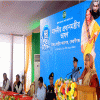Payra 'Power Hub': Dev frenzy wakes a lonesome land

Just nine months ago, Dhankhali in Kalapara of Patuakhali was nothing but a barren land with a handful of houses. But now there is activity, on a massive scale.
More than 3,500 Bangladeshi and Chinese engineers and workers are working round the clock there to get the country's first plant of the coal-based "power hub" up and running.
The electricity generation plant of the “power hub” is being built on the Payra river nearly 70km from Patuakhali district town at a cost of $1.6 billion.
Already 31 percent of the work is done and the authorities are hopeful that a 660MW unit will be commissioned by April 2019 and another 660MW one by October the same year.
State Minister for Power, Energy and Mineral Resources Nasrul Hamid along with a media team visited the power plant on Friday.
"Even three months ago the site was a barren land. But our engineers have been going ahead faster than the schedule they had been given," the minister told reporters.
The government plans to generate around 9,000MW from the coal-based “power hub” in the next five years, he said.
Nasrul Hamid said this was a desolate area without any road network and everything has to be built which is a big challenge.
Kalapara is on the two-lane road from Barisal to Kuakata via Patuakhali. The power plant site in Dhankhali is connected to Kalapara by a narrow 14km-long unpaved road.
Although the roads are currently in bad shape, earth filling was going on to expand the road to a dual carriageway.
About 1,000 acres of the power plant area has been fenced off with wall topped by barbed wires and special security has been implemented at Key Point Installations.
A herculean work is going on inside where about 1,500 Chinese engineers and workers, including women, work. About 2,000 local workers, including those affected by the land acquisition for the hub, have also been given jobs there.
The ground has been raised by seven meters at places by earth filling and the filling is still going on.
The structure of the first power plant has been completed where the machineries will be set up. Work on the construction of a silo to store the imported coal was going on.
Nasrul Hamid said five power plants would be set up inside the 1,000-acre area and those would produce about 6600MW. The remaining plants would be built in the vicinity.
A joint venture company, Bangladesh-China Power Company (Pvt) Ltd (BCPCL), has been formed with North-West Power Generation Company Ltd (NWPGCL) of Bangladesh, and China National Machinery Import and Export Corporation (CMC), for producing 1320MW of power.
The company was formed in March 2016. Land development work started that year and the construction work started in April.
Nasrul Hamid said for producing 9,000MW, around $12 billion would be spent, which was equal to the cost of constructing four Padma bridges. He said this would be the biggest power plant hub in the country.
The state minister said when the Padma Bridge is complete, the economic activities sparked by it would require about 12,000MW of electricity in the south-east area and the majority of it would be supplied from the Payra hub.
He said the power plant would use imported coal. They were in negotiations with Australia and Indonesia for importing coal. An expert had also been appointed for importing environment-friendly coal at a low cost, he said.
The state minister said the coal would be kept in the silo so that it did not pollute the local environment.
Construction work of the nearby port is still at the primary stage and when asked how the coal would be brought in, he said they would offload coal from ships on their own jetty.
He said the cost of electricity, to be produced by the coal-based power plant, would be much cheaper, around $.08 equivalent to Tk 6.40 kW/h.
The $1.6 billion cost of the plant includes 20 percent equity and 80 percent loans. The Chinese Exim Bank will finance the project.
Nasrul Hamid said China and Bangladesh share 50-50 equity.
He said a big challenge in setting up the power plant was resettlement of the displaced people. For each displaced family, a house and a pond are being built. They will be trained so that they can get jobs in the project area. Educational institutions and medical facilities will also be built for them, the state minister said.

 For all latest news, follow The Daily Star's Google News channel.
For all latest news, follow The Daily Star's Google News channel. 





Comments